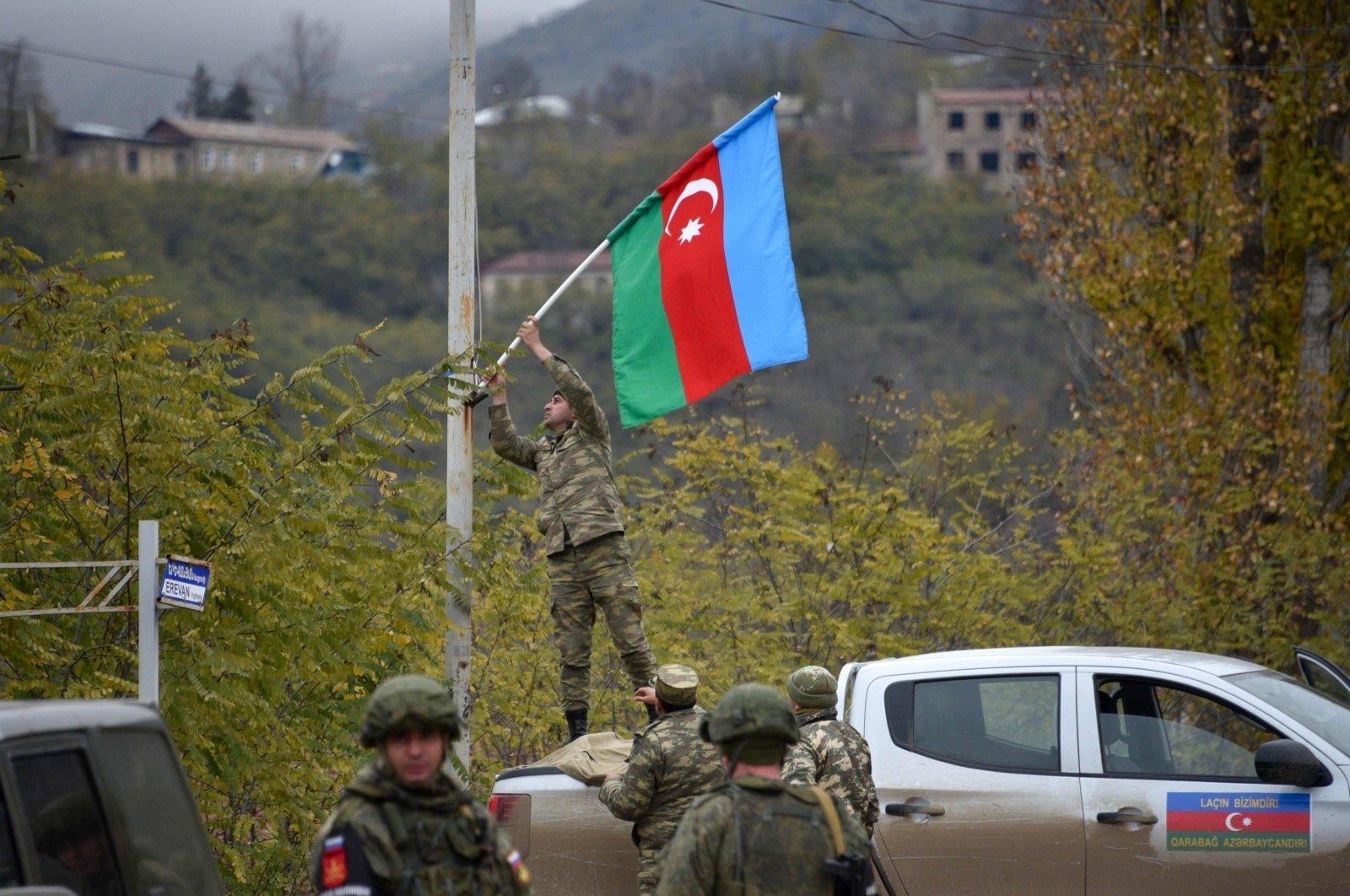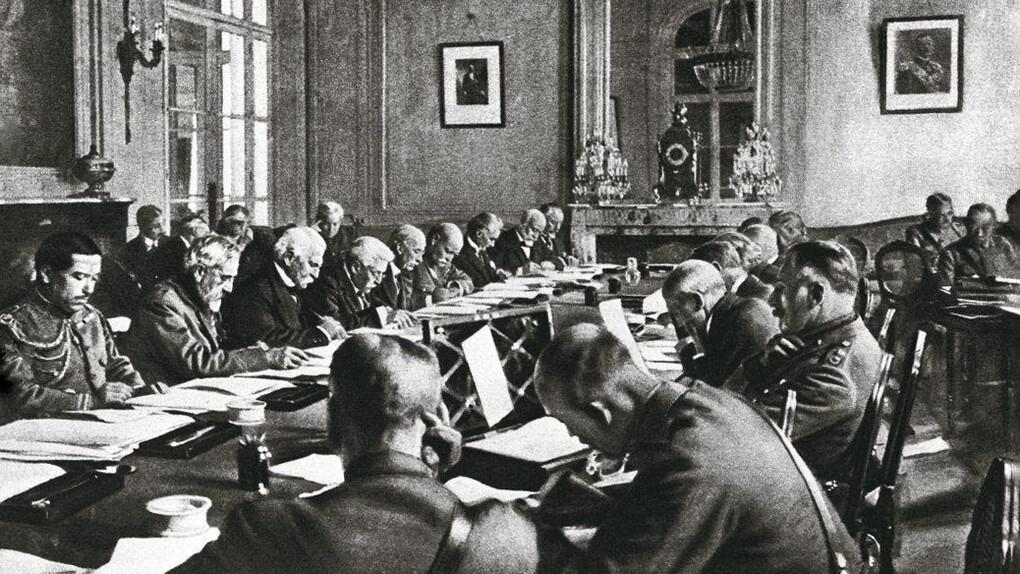Armenia self-invents its own Sevres syndrome
Revanchist confederation
ANALYTICS 03 August 2022 - 20:47
| Orkhan Amashov Caliber.Az |
Armenian revanchism can only be immense in its daring, if sufficient resources are utilised. This is very unlikely, given the facts on the ground, and it is bound to be disastrous in its ineluctable catastrophe, if pursued, leaving the nation in the lurch for generations to come.
Revenge is a potent intoxicant that could take a hopelessly vanquished one through an agonisingly futile process of seeking to avenge. When one harbouring grievance is immeasurably weaker than one’s nemesis, the grudge held is a recipe for self-destruction.
Loose war coalition
The revanchist cause in Armenia and amongst its diaspora remains strong. Its propagators and backers form a loose confederation, including the Kocharyan-Sargsyan supporters inside the National Assembly, considerable elements within the army, the Armenian Apostolic Church, the diaspora who has a vested ideological and financial interest in ensuring the preservation of Yerevan’s isolation within the neighbourhood, external arms suppliers and other actors driven by pecuniary considerations.
This confluence of a wide array of forces is endangered by the possibility of peace, as a transition to stability will render them less consequential and with a lesser degree of authority over the affairs of the nation.
The Church, as the custodian of the Armenian national identity as "God’s uniquely chosen people" is not remotely interested in peaceful coexistence with Azerbaijan and Turkiye, due to the massive loss of leverage over a society which has long been infested with what it has been preaching.
If the Church provides "spiritual foundations" for the revanchist cause, the contemporary opposition, with ties to the former "Karabakh clan" regime, gives it a definable content in domestic political discourse.
Given that the main strength of the aforementioned forces stems from pandering to the militaristic sentiments of society, after a comprehensive peace accord with Baku is signed, they will be politically emaciated, with their electoral base gradually evaporating.
The dynamics of ‘diaspora designs vs homeland realities’ will also be reshaped, as the worldwide Armenian diaspora will no longer be able to set the tempo or dictate the terms for Yerevan.
Peace is also devastating for all three elements as it militates against their long-held and deeply-entrenched notion that Azerbaijanis and Armenians are inherently incapable of living together. Former Armenian President Robert Kocharyan once said that the two nations are genetically incompatible, using this streak of rhetoric in a more diplomatic tone during the negotiations to propound the idea of a civilisational difference between the conflicting sides.

Sense of history
The present circumstances entrapping Armenia form an existential moment. It is vital that its meaning is judiciously understood. The existential import does not lie in the ‘loss of Karabakh’ per se, but in Armenia’s inability to accept this reality.
Pashinyan, for all his frailties and vacillations, has taken some steps towards a final peace over the past few months. Whenever he did something which could have been interpreted as a step away from the logic of former days, he has been viciously accused of treachery and sacrificing ‘sacrosanct’ Armenian objectives on the altar of a defeatist peace with Azerbaijan.
The revanchist cause is inextricably interwoven with a design that this is the time of resistance, and instead of ‘stooping to’ Azerbaijani demands, the line of vehement renunciation of the trilateral declaration provisions must be pursued.
History has known successful examples of defying what might have been deemed to be an inevitable course of events through the consolidation of resources under extraordinary circumstances. Turkiye – Armenia’s long-standing arch enemy - is a very good case in point.
The year 1919 constituted the lowest ebb in Turkish history. This was when Izmir was occupied by the Greeks, and Istanbul, the nation’s then-capital, was under de facto Allied occupation. The Sultan’s government was totally paralysed and unable to make independent decisions. This prompted some seemingly sensible Turks, guided by their country’s best interests, to suggest a peace accord with the victors of the First World War as the best mode of action.
A sense of defeatism and the premonition of even a greater calamity was palpable. The government of Damat Ferid Pasha was preaching a ‘sensible retrenchment’ to protect whatever was left of the Ottoman Empire, accepting the Allies’ demands.
It was the group of the resistant elements within the defeated Ottoman army, led by Mustafa Kemal, firmly convinced of the vital criticality of rejecting a defeatist peace accord, that organised a grand resistance from their newly-established base in Ankara. They reversed the course of history, much to the chagrin of the Armenians, who had had their own ambitions over the share of cake in the light of the Ottoman Empire’s dismemberment.

The parliament in Istanbul, in its final session, adopted the National Oath in January 1920, defining the territories not occupied at the time of signing the Armistice of Mudros (1918), inhabited by a Turkish majority, as the homeland of the Turkish nation. On this basis proceeded the government of the Grand National Assembly in Ankara, which pursued the line of resistance.
Being never ratified, the Treaty of Sevres went down in the annals of history as stillborn. But its mere name still causes a perturbation in Turkiye. Its association with inglorious acceptance of defeat and treachery remains palpable in the Turkish psyche.
There are those in today’s Armenia, fully convinced of their patriotism and sense of historic mission, who may think it is time to ride out the storm, reverse the "unjust course of history", overthrow the government of ‘defeatists and collaborationists’ and preserve the dignity of Armenian national pride.
And somehow unwittingly before signing a peace treaty with Azerbaijan, Armenia seems to have developed its own Sevres syndrome, which mandates that any accord with Baku or rapprochement with Ankara must be resisted, and it is vital to get through the presently agonising stage. These final straw-grabbing soothsayers anticipate that circumstances may eventually be sufficiently auspicious to retaliate and reverse the results of the Second Karabakh War.
Such a mindset largely forms the crux of the revanchist cause in today’s Armenia. Its premise is predicated on the idea that resisting ‘the loss of Karabakh’ is of existential importance. Herein lies the cause of the trouble.
The false conviction as to who is the rightful owner of the given territory and the attempt to give it a meaning along the lines of national self-determination constitute the basis of the grand delusion that feeds the toxic and ultimately destructive desire that guides the minds of the revenge-driven segments of Armenian society.
What then? … There is a journey ahead, the duration of which is unknown. Blood may yet be shed again.
As sure as the Pope is Catholic, Armenia’s ‘moment of relief’ from this angst will come once Pashinyan, or his successor, following the mores of cold reason, will sign a peace treaty with Azerbaijan, officially and unreservedly renouncing any claim on Karabakh.
Caliber.Az
|
1
|
20 points. What did Armenia, the EU and the US agree on in Brussels? Sensational details on Caliber.Az
17 April 2024 - 11:01
|
|
2
|
Times: UK, Armenia hold talks on sending illegal migrants to Armenia
15 April 2024 - 10:00
|
|
3
|
"Historical" Armenia vs. present-day Armenia Unveiling the conundrum
15 April 2024 - 09:11
|
|
4
|
Caliber.Az to reveal sensational details of "Brussels meeting" Important announcement
16 April 2024 - 12:09
|
|
5
|
Iran seeks international backing following missile strikes on Israel Raisi calls Russia & Qatari leaders amid tension
17 April 2024 - 16:56
|
Armenian premier rules out snap elections prior to border delimitation with Azerbaijan
18 April 2024 - 09:24
Azerbaijan marks 31st anniversary of Bashlibel massacre
18 April 2024 - 09:14
China's BYD unveils three new models for its off-road Fangchengbao lineup
18 April 2024 - 09:02
More efficient than hydrogen and produces more energy
chemical element we had ignored18 April 2024 - 07:03
At Chinese trade fair, exporters despair their goods - "as cheap as cabbage"
18 April 2024 - 05:04
Europe restarts magnesium mining to counter reliance on China
18 April 2024 - 03:05
Lithuania, Rheinmetall sign agreement for 155mm ammunition plant
18 April 2024 - 01:03
Want to move to Europe?
17 April 2024 - 23:00
IDF strikes Hezbollah military facilities in Lebanon
17 April 2024 - 21:18
Georgian PM accuses country’s President of being an “agent of foreign influence”
In rebuke on transparency bill17 April 2024 - 21:15
Azerbaijan to showcase climate change adaptation at COP29
FAO official says17 April 2024 - 21:10
Swiss parliament wants ban on extremist symbols
17 April 2024 - 20:58
Protest rally against foreign agents bill resumes in Tbilisi
17 April 2024 - 20:50
UK urges European countries to increase defence spending
17 April 2024 - 20:45
AZAL, DFS aviation services forge key partnership to equip Lachin airport
17 April 2024 - 20:33
Turkish FM, Hamas leader discuss Gaza aid, cease-fire
17 April 2024 - 20:20
Russian peacekeepers' mission in Karabakh accomplished
Member of State Duma says17 April 2024 - 20:08
Tackling 10 prejudices about hydrogen following Clean Transition Dialogues
17 April 2024 - 20:00
Azerbaijani Ombudswoman raises mine issue in liberated territories at meeting with UNDP rep
17 April 2024 - 19:53
Azerbaijan, Tatarstan forge stronger ties across trade, innovation, humanitarian endeavors
17 April 2024 - 19:40
Azerbaijani FM, CICMA executive director engage on chairmanship priorities & collaboration
17 April 2024 - 19:32
Azerbaijan plans Europe-bound exports of green hydrogen made in "recently liberated territories"
Article by Hydrogen Insight17 April 2024 - 19:28
UK PM Sunak plans to create "smoke-free generation" with tough measures on tobacco
17 April 2024 - 19:13
Azerbaijan and Albania announce visa-free regime
Legislative progress underway17 April 2024 - 18:59
Azerbaijan, Tatarstan discuss developmental directions of economic partnership
17 April 2024 - 18:46
OSCE Chair-in-Office due in Azerbaijan
17 April 2024 - 18:30
Armenia's economy lacks development
Expert highlights concerns17 April 2024 - 18:15
Azerbaijan's Air Force, Air Defence Forces conduct tactical exercises in Nakhchivan
Video, Photo footage from drills17 April 2024 - 18:01
UN continues support for Azerbaijan's demining efforts in Karabakh region
17 April 2024 - 17:48
Azerbaijani president designates Shusha as 2024 Youth Capital of OIC
Action plan underway17 April 2024 - 17:35
Czech Republic collects 500,000 shells for Ukraine
17 April 2024 - 17:23
President: Iran’s operation shatters Israeli military’s invincibility myth
17 April 2024 - 17:10
Iran seeks international backing following missile strikes on Israel
Raisi calls Russia & Qatari leaders amid tension17 April 2024 - 16:56
Georgian parliament approves draft law on foreign agents
17 April 2024 - 16:41
Azerbaijan, Israel discuss energy cooperation
17 April 2024 - 16:27
Is Ukraine on the edge?
Big vulnerabilities17 April 2024 - 16:13
Azerbaijan, Pakistan discuss defence cooperation
17 April 2024 - 15:59
United States enhances support for Armenia
17 April 2024 - 15:45
EU interested in Azerbaijan's development of Middle Corridor
PHOTO17 April 2024 - 15:31
President Aliyev, Kairat Sarybay discuss COP29, green transport concept
17 April 2024 - 15:27
